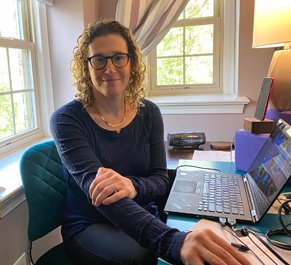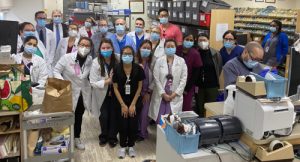Here, we present a collection of compelling interviews conducted with rheumatologists and rheumatology professionals focusing on their experiences thus far in the COVID-19 pandemic. The pandemic’s impact is illustrated by these stories on individual rheumatology practices, medical education for fellows, and how social workers and nurses are assisting rheumatology patients at this time, to name just a few.
 As the mystery solvers, we are supposed to be comfortable with the unknown, but how does that translate when COVID-19 hits home? A rheumatologist contracted COVID-19 and tells us her story in, “On Pandemics & Uncertainty: One Rheumatologist’s Story.”
As the mystery solvers, we are supposed to be comfortable with the unknown, but how does that translate when COVID-19 hits home? A rheumatologist contracted COVID-19 and tells us her story in, “On Pandemics & Uncertainty: One Rheumatologist’s Story.”
Telemedicine has become integral to how rheumatologists and rheumatology professionals are caring for patients while maintaining social distance. For more insights into telemedicine, read “A Transition to 90% Telemedicine” and “Transitioning to a Virtual Practice.” One practice is looking beyond the COVID-19 pandemic by combining its telemedicine functionality with long-term workflow solutions: “Mobilizing a Long-Term Telemedicine Solution.”
Working within a community experiencing a high number of confirmed COVID-19 cases requires a strategic approach to manage patient care. Learn how one clinic in Los Angeles is adapting in “Adjusting Patient Care to Social Distancing.” Another rheumatologist discusses the challenges of treating children in “Adapting Care for Pediatric Patients & Parents During the Pandemic.”
Meanwhile, as standard approaches to rheumatology practice and research change dramatically, some have found new opportunities to connect and new research questions to investigate. Read more in “Finding Opportunity Through Challenge.”
Limited access to in-person training for fellows and in-person visits with patients has spurred creative solutions by rheumatology teams: “Forging New Ways to Teach in Response to COVID-19.”
Rheumatology leaders are adapting to telemedicine and other modified collaborations to adjust patient care and research during the COVID-19 pandemic: “Collaborating at the Leadership Level.”
The pandemic is taking a personal toll on some practices, with layoffs, stalled research and more. Others are getting creative to keep staff connected personally while maintaining social distance and safety. Read more in “The Personal Side of COVID-19” and “How to Maintain Connections with Colleagues, Staff & Patients During a Pandemic.” Healthcare professionals are also working to care for their patients’ mental, as well as physical, health. Learn how in “Patients Need Psychosocial Support Now More Than Ever.”

The Montefiore Medical Center pharmacy team is a vital part of the frontline staff working to combat COVID-19 in New York City.
Pharmacy teams are experiencing unique challenges that may alter how some institutions manage their patients and work: “New Processes May Stick Around After the Pandemic.” And learn how one pharmacy staff is responding to the outbreak in “Pharmacy Team Combats COVID-19 in NYC.”


